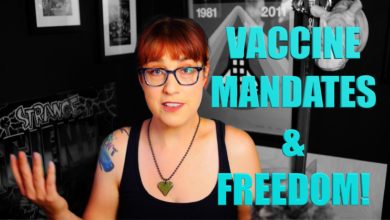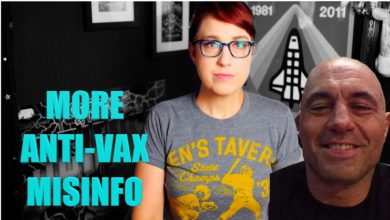Facebook Paid for a “Study” that Says Apple’s Privacy Updates are BAD
This post contains a video, which you can also view here. To support more videos like this, head to patreon.com/rebecca!
Exciting new study just dropped, everyone, and it’s very relevant to me and probably to you if you also use social media! “Harming Competition and Consumers under the Guise of Protecting Privacy: An Analysis of Apple’s iOS 14 Policy Updates”. Oh shit! You guys, what if privacy is….bad???
Okay, so let’s start with some background: iOS 14 is Apple’s latest operating system for the iPhone. It was released back in September of 2020, and as of the 14.5 update that arrived at the end of April, it now forces apps to ask you, the user, if they can track your personal data and share it with unrelated third parties. Often they want to do that because of advertising — the more a corporation knows about you, the more efficient it is for them to advertise to you and get your business. Like, if my company sells dog biscuits and I have to pay a dollar for every pamphlet I print out, and I only have $100, would I rather hand those pamphlets out to 100 random people on the street or 100 dog owners? Obviously the latter, but how do I find out who has a dog and who doesn’t? Well, if I can see what they’re searching for on Google or what Facebook groups they join, I will better know where to put my money. So, Google and Facebook can offer you “free” services like email and a Facebook profile so that they can take your data and share it with me, so I know that when I pay to place ads on Facebook it’s going to better target my customers than if I pay to place ads somewhere else. They might also share it with companies for other reasons, like trading for their customers’ data or other deals. It’s a win-win, until you maybe start to wonder if it’s worth it to you to have a free Facebook profile page if it means that Facebook has free reign to read your private messages and track everything you do across the internet and share that information not just with me, the pure-hearted dog biscuit entrepreneur, but also with Amazon or Spotify or people campaigning for Brexit or fascist governments. And in the case of the Cambridge Analytica scandal, certain Facebook apps were able to do that not just for the data of the people who downloaded and used the app but for their friends.
So with Apple’s 14.5 update, they forced non-Apple apps to make users opt-in or opt-out of data sharing. Seems pretty cut and dry, right? They still let apps collect your data, but now they have to ask you first.
Facebook would probably like you to consider it a little less cut-and-dry, though, considering at least one survey that found that only 2% of iOS users say that they would actually agree to let a company track their data.
This may have all sounded very one-sided thus far, but that’s just set-up for “Harming Competition and Consumers under the Guise of Protecting Privacy: An Analysis of Apple’s iOS 14 Policy Updates,” a REVOLUTIONARY new SCIENTIFIC STUDY that found that ACTUALLY Apple’s privacy update is BAD. Before we talk about that, let me point out a few important facts:
- This “analysis” is wholly funded by Facebook.
- It’s “published” on SSRN, formerly known as Social Science Research Network, which is not a peer-reviewed journal, or a journal at all. It’s just a website where anyone can upload a paper to get feedback, maybe before submitting it to an actual journal
Also just for fun here are some important facts about me:
- I own Apple products and use Facebook
- I make money (indirectly) from Apple, from Facebook and other social media outlets, and from advertising like Google Adsense like you may see pop up on this very video, so I have dual vested interests here
- I distrust all large companies. Honestly, a giant corporation like Apple fighting another giant corporation like Facebook is a real “Alien vs. Predator” situation. Whoever wins, we lose. But okay sure, when they’re fighting you can maybe figure that one of them is a little less evil than other so let’s root for that guy. I think it’s Predator? Was Predator the less evil guy in that movie? I honestly don’t remember. I do know that in Godzilla vs King Kong they were BOTH the good guy, even though they probably murdered a lot of innocent people. Anyway.
In “Harming Competition and Consumers under the Guise of Protecting Privacy: An Analysis of Apple’s iOS 14 Policy Updates,” Facebook argues…I’m sorry, Facebook paid a law professor and an associate professor of business administration to argue that asking people if they want their private data to be tracked and shared is actually bad for a few reasons of varying levels of laughability. For instance, “Consumers will lose many valued free services they get from ad-supported apps.” That is very true! As someone who desperately wants a company to make a mindless puzzle app that I can pay for instead of having ads constantly interrupting my mindless puzzles, I can’t wait to lose that valued free service but I’m sure some people would rather have ads than pay for apps. Those people can choose to give up their privacy! That’s sort of the point: this notification gives people the option to share their data across apps and websites or not. If a lot of people choose not to share, some apps will be forced to change how they make money or simply move to a platform that doesn’t give users control over their privacy. Those platforms still exist and in fact they represent about 51% of the market.
Another complaint the paper alleges is that “Consumers will be left with less relevant (but not necessarily fewer) ads.” That’s also true! Honestly, sometimes I know I want, say, a new hoodie but I’m not sure which one I want, so I Google the word “hoodie” and then head over to instagram and scroll through the ads. I do this. I know. I know.
But honestly, I am happy to lose that tiny advantage in favor of not letting Facebook (the owner of Instagram) to continue profiting off of my private data without my consent. Other people may not want to give that up, at which point, again, THEY CAN CONTINUE TO ALLOW FACEBOOK AND INSTAGRAM TO TRACK THEM ACROSS APPS.
What this, and many other complaints in the paper, are actually arguing is that it is bad to give users a choice because they will choose to do something that hurts Facebook’s business model. “Humans would just do the wrong thing if we gave them free will” is the kind of argument a supervillain makes. I mean that literally! It’s the plot of the Matrix!
Facebook only makes one…wait sorry I mean the paper’s authors only make one argument that may actually be compelling to an outside observer, so I’ll just skip to that one: the new privacy prompt is bad because it only shows up on non-Apple apps. “Notably,” the authors write, “this requirement does not apply to Apple’s own apps and services.”
Well now, that is a bad thing! So, Apple’s own apps will track you across apps and websites and share your data with 3rd parties with no need for you to opt-in? Um, no. Nope. That’s not what happens. At all. Because you see, they cite Apple’s privacy statement to back that up, but if you go read it you will learn that Apple explicitly states “Our advertising platform doesn’t share personally identifiable information with third parties” and “Apple’s advertising platform does not track you, meaning that it does not link user or device data collected from our apps with user or device data collected from third parties for targeted advertising or advertising measurement purposes, and does not share user or device data with data brokers.”
So no, this would not allow Apple’s own apps to track users across different apps and websites. That’s how Apple’s ad network has always worked and they’ve given no indication that they’re planning to change that. In fact, they won’t change that because that’s the entire point of their ad network.
Apple’s ad platform is known as SKadNetwork, which they specifically built as a response to the privacy concerns of users. Essentially, when a user clicks an ad, all identifying information about the user is stripped and aggregated before it goes back to the advertiser to tell them “someone clicked your ad,” meaning that the advertiser knows their ad was successful but has no way to track any one user.
As far as user privacy goes, that’s an objectively better way of doing things than other ad networks. So, does that mean that these new privacy opt-ins will favor Apple’s ad network over other ad networks? YES. Absolutely. This is the “walled garden” that Apple has become famous for: if advertisers want to be on Apple devices, they will get better results using Apple’s ad network because it’s the only one prioritizing privacy. Literally none of this would happen if Facebook hadn’t built an entire billion dollar corporation based on tricking people into handing over their personal data (or having that personal data secretly swiped).
But since Apple is the biggest, most successful corporation that is pushing for better user privacy, and they are the ones selling both the phones and the ad network, does that make them a monopoly? Maybe! I don’t know, I’m not a lawyer. I do know that it makes me extremely uncomfortable…like I said, this is an Alien vs Predator situation and once the Alien is dead the Predator isn’t going to be cool with us. So I would much prefer that other large corporations follow suit and that the days of these companies profiting off of exploiting our privacy are numbered.
Oh but anyway this new “paper” isn’t science, it’s propaganda paid for by Facebook. The end.




